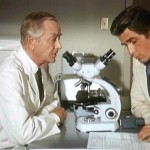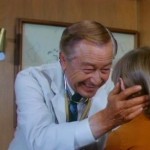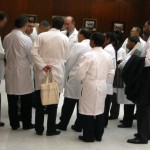 In one of the best scenes of the episode, medical professionals are standing by in the operating room, ready to receive the organs that are about to be removed. Chief Resident Miranda Bailey — my favorite character (played by Chandra Wilson) — is emotionally distraught at the loss of George. She asks for information about the destination of the eyes, the liver, the heart. The details of the organ donations – the benefits they will bring to the particular children and adults who have been waiting and hoping for this opportunity – are quite moving. Read more
In one of the best scenes of the episode, medical professionals are standing by in the operating room, ready to receive the organs that are about to be removed. Chief Resident Miranda Bailey — my favorite character (played by Chandra Wilson) — is emotionally distraught at the loss of George. She asks for information about the destination of the eyes, the liver, the heart. The details of the organ donations – the benefits they will bring to the particular children and adults who have been waiting and hoping for this opportunity – are quite moving. Read more
Author Archives: Jan
The Affordable Care Act and the Civil Rights Act
 The Civil Rights Act barred private businesses such as hotels, bus companies, and restaurants from refusing to sell their products or services to customers on the basis of race. The ACA bars state-licensed health insurers from refusing to sell products to individuals on the basis of health status. … This basic reconceptualization of health insurance as a good whose availability is a matter of national public interest essentially frames health insurance the way the Civil Rights Act framed other business interests. Read more
The Civil Rights Act barred private businesses such as hotels, bus companies, and restaurants from refusing to sell their products or services to customers on the basis of race. The ACA bars state-licensed health insurers from refusing to sell products to individuals on the basis of health status. … This basic reconceptualization of health insurance as a good whose availability is a matter of national public interest essentially frames health insurance the way the Civil Rights Act framed other business interests. Read more
Chilean miners benefit from older doctors
 There was no way to use a catheter or give him an IV. We solved the problem the way we would have 50 years ago, with warm compresses and oral antispasmodics. … It has been very important that the [medical] team include older physicians, like me. Read more
There was no way to use a catheter or give him an IV. We solved the problem the way we would have 50 years ago, with warm compresses and oral antispasmodics. … It has been very important that the [medical] team include older physicians, like me. Read more
Updates: Commercialization of infidelity, medical rivalry, conservatives on climate change, football concussions
 As a practicing pediatrician, I, too, feel the nobility and privilege of my profession, and count myself lucky every day that I am able to do what I do. But to denigrate lawyers and journalists as somehow less valuable to society is beneath us as a profession. Read more
As a practicing pediatrician, I, too, feel the nobility and privilege of my profession, and count myself lucky every day that I am able to do what I do. But to denigrate lawyers and journalists as somehow less valuable to society is beneath us as a profession. Read more
I’m now a regular blogger on ConsultantLive
 I‘m now a monthly guest blogger on ConsultantLive, and my first post appeared today. It’s the one where Marcus Welby gives a speech on the rewards of general practice as opposed to specialization. … My column on the site is called “How Health Happened.” It’s mainly about the history of 20th century medicine and how that relates to changing attitudes towards health. Read more
I‘m now a monthly guest blogger on ConsultantLive, and my first post appeared today. It’s the one where Marcus Welby gives a speech on the rewards of general practice as opposed to specialization. … My column on the site is called “How Health Happened.” It’s mainly about the history of 20th century medicine and how that relates to changing attitudes towards health. Read more
The tyranny of health then and now
 When we hear the words “tyranny of health” these days, it’s usually a reference to the tyranny of health care. It brings to mind images of protesters carrying signs that denounce the “socialism” of Obamacare. As recently as 1994, however, the tyranny of health had a different meaning … the idea that patients should be coerced into being healthy. Read more
When we hear the words “tyranny of health” these days, it’s usually a reference to the tyranny of health care. It brings to mind images of protesters carrying signs that denounce the “socialism” of Obamacare. As recently as 1994, however, the tyranny of health had a different meaning … the idea that patients should be coerced into being healthy. Read more
“Tyranny of health” on KevinMD
 That we’re not routinely made seriously ill by this shortfall … is due largely to the fact that most medical interventions and advice don’t address life-and-death situations, but rather aim to leave us marginally healthier or less unhealthy, so we usually neither gain nor risk all that much. Read more
That we’re not routinely made seriously ill by this shortfall … is due largely to the fact that most medical interventions and advice don’t address life-and-death situations, but rather aim to leave us marginally healthier or less unhealthy, so we usually neither gain nor risk all that much. Read more
Nurse anesthetists sing “Waking up is hard to do”
 A must view, for the sheer fun and pleasure of it! Thanks to Roberta, for pointing this out to me, and to Not Totally Rad (a radiologist’s blog) for posting it.
A must view, for the sheer fun and pleasure of it! Thanks to Roberta, for pointing this out to me, and to Not Totally Rad (a radiologist’s blog) for posting it.
The Laryngospasms (the Spasms, for short) are a group of nurse anesthetists who can really sing. More of their music videos are available on their website. Read more
Medicalization then and now
 The American Medical Association once complained about rival practitioners who invented new diseases. A hundred years later, medical thought leaders (also known as Key Opinion Leaders) are paid to promote new diseases.
The American Medical Association once complained about rival practitioners who invented new diseases. A hundred years later, medical thought leaders (also known as Key Opinion Leaders) are paid to promote new diseases.
Is this progress? Read more
Soft drinks and food stamps: From bad to worse
 Science aside, I find it objectionable to single out low-income people for control by their government. Let’s not further insult the dignity of those who need food stamps in these difficult economic times by fighting the obesity battle on their backs. Read more
Science aside, I find it objectionable to single out low-income people for control by their government. Let’s not further insult the dignity of those who need food stamps in these difficult economic times by fighting the obesity battle on their backs. Read more
Democrats and Republicans: How they differ
 In the face of all this, it seems not to have occurred to a single prominent Democrat, from Obama on down, to say something like: We love our country every bit as much as they do, and we believe patriotism means expanding access to health care, protecting the environment, and imposing effective new rules on Wall Street. Democrats have thus crippled themselves by adapting comparatively limited ideas of legitimate political action, and by ceding to Republicans the strong claim of love of one’s country. Read more
In the face of all this, it seems not to have occurred to a single prominent Democrat, from Obama on down, to say something like: We love our country every bit as much as they do, and we believe patriotism means expanding access to health care, protecting the environment, and imposing effective new rules on Wall Street. Democrats have thus crippled themselves by adapting comparatively limited ideas of legitimate political action, and by ceding to Republicans the strong claim of love of one’s country. Read more
Once in a lifetime: Marcus Welby and David Bryne
 Marcus Welby was not necessarily the inspiration here, of course. Alienation – and the dissatisfaction that comes with a midlife crisis — pervaded the zeitgeist in the seventies.
Marcus Welby was not necessarily the inspiration here, of course. Alienation – and the dissatisfaction that comes with a midlife crisis — pervaded the zeitgeist in the seventies.
Whatever happened to alienation, anyway? Perhaps it fell along with the Berlin Wall. Or succumbed to Prozac. Read more
Marcus Welby vs. the specialists
 Tell me, doctors, are you a specialist or a GP? Or sometimes they say “or just a GP?” But of course we are specialists. And our specialty, like any other, has certain advantages and certain disadvantages. The money is good, but you have to work three times as hard for it. But you people know all about that. Read more
Tell me, doctors, are you a specialist or a GP? Or sometimes they say “or just a GP?” But of course we are specialists. And our specialty, like any other, has certain advantages and certain disadvantages. The money is good, but you have to work three times as hard for it. But you people know all about that. Read more
Health care reform and the 2010 elections
 Bottom line: If you want to avoid a government shutdown, or the “dysfunctional and failed republic” scenario, vote on November 2 for candidates who support health care reform. Read more
Bottom line: If you want to avoid a government shutdown, or the “dysfunctional and failed republic” scenario, vote on November 2 for candidates who support health care reform. Read more
Should doctors work weekends?
 Orszag is an economist who wants the medical “industry” to be run as efficiently as any other business. “[I]f you can’t measure it, you can’t manage it,” he says. But medicine is not like other business ventures. For one thing, its services are responsible for the life, death, and suffering of human beings. This is unique. Also, it doesn’t operate with the usual economic model of supply, demand, and shopping for competitive prices. When health hangs in the balance, time is limited and choices are few. You don’t decide to forego surgery the way you postpone the purchase of a new car. Read more
Orszag is an economist who wants the medical “industry” to be run as efficiently as any other business. “[I]f you can’t measure it, you can’t manage it,” he says. But medicine is not like other business ventures. For one thing, its services are responsible for the life, death, and suffering of human beings. This is unique. Also, it doesn’t operate with the usual economic model of supply, demand, and shopping for competitive prices. When health hangs in the balance, time is limited and choices are few. You don’t decide to forego surgery the way you postpone the purchase of a new car. Read more
The dismal future of unemployment
 The only thing highly developed countries can do in the face of cheap foreign labor is to play their ace card. Where these countries excel is with industries that are knowledge intensive – “capital-intensive advanced industries where knowledge counts for everything.” But we are unable to teach the skills required for those jobs as rapidly as the need for employment requires. Those skills constantly go out of date. Read more
The only thing highly developed countries can do in the face of cheap foreign labor is to play their ace card. Where these countries excel is with industries that are knowledge intensive – “capital-intensive advanced industries where knowledge counts for everything.” But we are unable to teach the skills required for those jobs as rapidly as the need for employment requires. Those skills constantly go out of date. Read more
We’re all on Prozac now
Side Effects May Include
Now available
over the counter, the phone, or the Internet—
even on the corner—
with or without a subscription.Clinically proven to
counteract depressed mood,
soothe frazzled nerves,
decrease heart and respiratory rate …
Why don’t hospital workers wash their hands?
 Am I missing something here or does this say we shouldn’t publicize information about hospitals with poor hygiene because they’ll just lie about the facts or be otherwise devious and dishonest? Plus, reputation – that is, the financial profits of medicine – is more important than the health and safety of patients? No, it couldn’t be saying that. Read more
Am I missing something here or does this say we shouldn’t publicize information about hospitals with poor hygiene because they’ll just lie about the facts or be otherwise devious and dishonest? Plus, reputation – that is, the financial profits of medicine – is more important than the health and safety of patients? No, it couldn’t be saying that. Read more
Michelle Chappel – No Place Like Home
 October 10, 2010 — 10/10/10 — is World Homeless Day. My friend Michelle Chappel Millis has written a song and made a video in support of this cause. It’s called “No Place Like Home.”
October 10, 2010 — 10/10/10 — is World Homeless Day. My friend Michelle Chappel Millis has written a song and made a video in support of this cause. It’s called “No Place Like Home.”
Michelle encourages all viewers to share the video – here’s the YouTube link – as a way to raise awareness of the problem of homelessness. If you’re so moved, please contribute to registered charities in your locality. Read more
Should psychiatrists go to med school?
 One of the problems Carlat readily acknowledges is that psychiatry is excessively focused on psychopharmaceuticals at the expense of other effective treatments. Not only is there too much focus when it comes to treatment. There’s so much money flowing from the pharmaceutical industry to psychiatrists that one has to seriously question the profession’s ability to be objective. Read more
One of the problems Carlat readily acknowledges is that psychiatry is excessively focused on psychopharmaceuticals at the expense of other effective treatments. Not only is there too much focus when it comes to treatment. There’s so much money flowing from the pharmaceutical industry to psychiatrists that one has to seriously question the profession’s ability to be objective. Read more
Should grief be labeled and treated as depression?
 The American Psychiatric Association (APA) is in the process of revising the Diagnostic and Statistical Manual of Mental Disorders (DSM) – the psychiatrist’s bible. Its last incarnation — known as DSM IV — was published in 2000. The new version will be DSM V. … One item in dispute is whether bereavement – the grieving process that follows the loss of a loved one – might qualify a patient for the DSM label Major Depressive Episode. Read more
The American Psychiatric Association (APA) is in the process of revising the Diagnostic and Statistical Manual of Mental Disorders (DSM) – the psychiatrist’s bible. Its last incarnation — known as DSM IV — was published in 2000. The new version will be DSM V. … One item in dispute is whether bereavement – the grieving process that follows the loss of a loved one – might qualify a patient for the DSM label Major Depressive Episode. Read more
Support the Fair Elections Now Act
 Watching political news on TV can be depressing and distressing. Even the most respectable news organizations treat politics as a sporting event. The Fair Elections Now Act is a chance to express support for something that could make a positive and important difference in the legislative future of the United States. It would be an enormous win for the common good. Read more
Watching political news on TV can be depressing and distressing. Even the most respectable news organizations treat politics as a sporting event. The Fair Elections Now Act is a chance to express support for something that could make a positive and important difference in the legislative future of the United States. It would be an enormous win for the common good. Read more
Lobbying against formula for babies
 You might think that companies confident in their products’ value would welcome the chance for a federal stamp of approval, not fight it. But the Big Three formula manufacturers—Nestle, Mead Johnson, and Abbot Laboratories – did just that. … Without a show of courage from the House leadership, the story of WIC and functional ingredients could turn out to be yet another well-known Washington narrative — powerful, wealthy corporations fighting straightforward, evidence-based policymaking. Read more
You might think that companies confident in their products’ value would welcome the chance for a federal stamp of approval, not fight it. But the Big Three formula manufacturers—Nestle, Mead Johnson, and Abbot Laboratories – did just that. … Without a show of courage from the House leadership, the story of WIC and functional ingredients could turn out to be yet another well-known Washington narrative — powerful, wealthy corporations fighting straightforward, evidence-based policymaking. Read more
Century-old kerfuffle over the “syrup” in corn syrup
 I see that the Corn Refiners Association is petitioning the FDA to change the name of their ingredient – as it appears on food labels — from corn “syrup” to corn “sugar.” There’s an amusing footnote to this story. A hundred years ago, Karo Corn Syrup – a product still on the market – was fighting to be listed as “syrup,” not glucose (a simple sugar), on its label. Read more
I see that the Corn Refiners Association is petitioning the FDA to change the name of their ingredient – as it appears on food labels — from corn “syrup” to corn “sugar.” There’s an amusing footnote to this story. A hundred years ago, Karo Corn Syrup – a product still on the market – was fighting to be listed as “syrup,” not glucose (a simple sugar), on its label. Read more
Merchants of Doubt
 It’s easy to understand – if not condone – the behavior of politicians who are financed by tobacco and oil companies. They oppose the regulation of smoking or pollution because they benefit from the financial contributions of those industries. But what motivates certain scientists to relentlessly cast doubt on peer-reviewed scientific evidence that’s inconveniently contrary to financial interests? Read more
It’s easy to understand – if not condone – the behavior of politicians who are financed by tobacco and oil companies. They oppose the regulation of smoking or pollution because they benefit from the financial contributions of those industries. But what motivates certain scientists to relentlessly cast doubt on peer-reviewed scientific evidence that’s inconveniently contrary to financial interests? Read more
Childhood obesity and will power
 Between 1985 and 2000, the retail price of carbonated soft drinks rose by 20%, the prices of fats and oils by 35%, and those of sugars and sweets by 46%, as compared with a 118% increase in the retail price of fresh fruits and vegetables. …
Between 1985 and 2000, the retail price of carbonated soft drinks rose by 20%, the prices of fats and oils by 35%, and those of sugars and sweets by 46%, as compared with a 118% increase in the retail price of fresh fruits and vegetables. …
Healthy, low-calorie foods cost more money and take more effort to prepare than processed, high-calorie foods. … Drewnowski estimated that a calorie-dense diet cost $3.52 a day compared with $36.32 a day for a low-calorie diet.
Read more
The art and science of medicine
 A more nuanced translation of Hippocrates’ original Greek text might read: Life is too short; the task is huge; the right time is like a razor blade; the road to experience is fraught with hazards; to continuously accept reality and critical thought over hope and prejudice is taxing. Read more
A more nuanced translation of Hippocrates’ original Greek text might read: Life is too short; the task is huge; the right time is like a razor blade; the road to experience is fraught with hazards; to continuously accept reality and critical thought over hope and prejudice is taxing. Read more
The pleasures and complexities of taste
 Back in March and April of 2009 I wrote a long series of posts on taste. I got interested in it through the idea of supertasters – individuals who are overly sensitive to certain bitter tastes and, as a result, have their own set of food preferences. When More Time Than Dough contacted me about quoting from one of those posts, I decided to clean them up and present them as a series. Read more
Back in March and April of 2009 I wrote a long series of posts on taste. I got interested in it through the idea of supertasters – individuals who are overly sensitive to certain bitter tastes and, as a result, have their own set of food preferences. When More Time Than Dough contacted me about quoting from one of those posts, I decided to clean them up and present them as a series. Read more
Knowing when you’ll die: Tony Judt’s last interview
 I have no idea where I’ll be next month. I could be silent. I could be dead. I could be exactly like this. I could be in a variety of stages. But I know, absolutely with certainty – within reason – that I’ll be dead in five years. And that reversal of consciousness means that I am very focused upon life in the next two weeks. Read more
I have no idea where I’ll be next month. I could be silent. I could be dead. I could be exactly like this. I could be in a variety of stages. But I know, absolutely with certainty – within reason – that I’ll be dead in five years. And that reversal of consciousness means that I am very focused upon life in the next two weeks. Read more
Teens benefit from later school start time
 As kids approach puberty, scientists now know, there is a two-hour shift in when their bodies release melatonin, the hormone that causes sleepiness. As a result, teens and preteens find it impossible to fall asleep until about 11 p.m., even if they try to go to bed earlier. Yet teenagers still need an average of 9.25 hours of slumber each night. Read more
As kids approach puberty, scientists now know, there is a two-hour shift in when their bodies release melatonin, the hormone that causes sleepiness. As a result, teens and preteens find it impossible to fall asleep until about 11 p.m., even if they try to go to bed earlier. Yet teenagers still need an average of 9.25 hours of slumber each night. Read more


